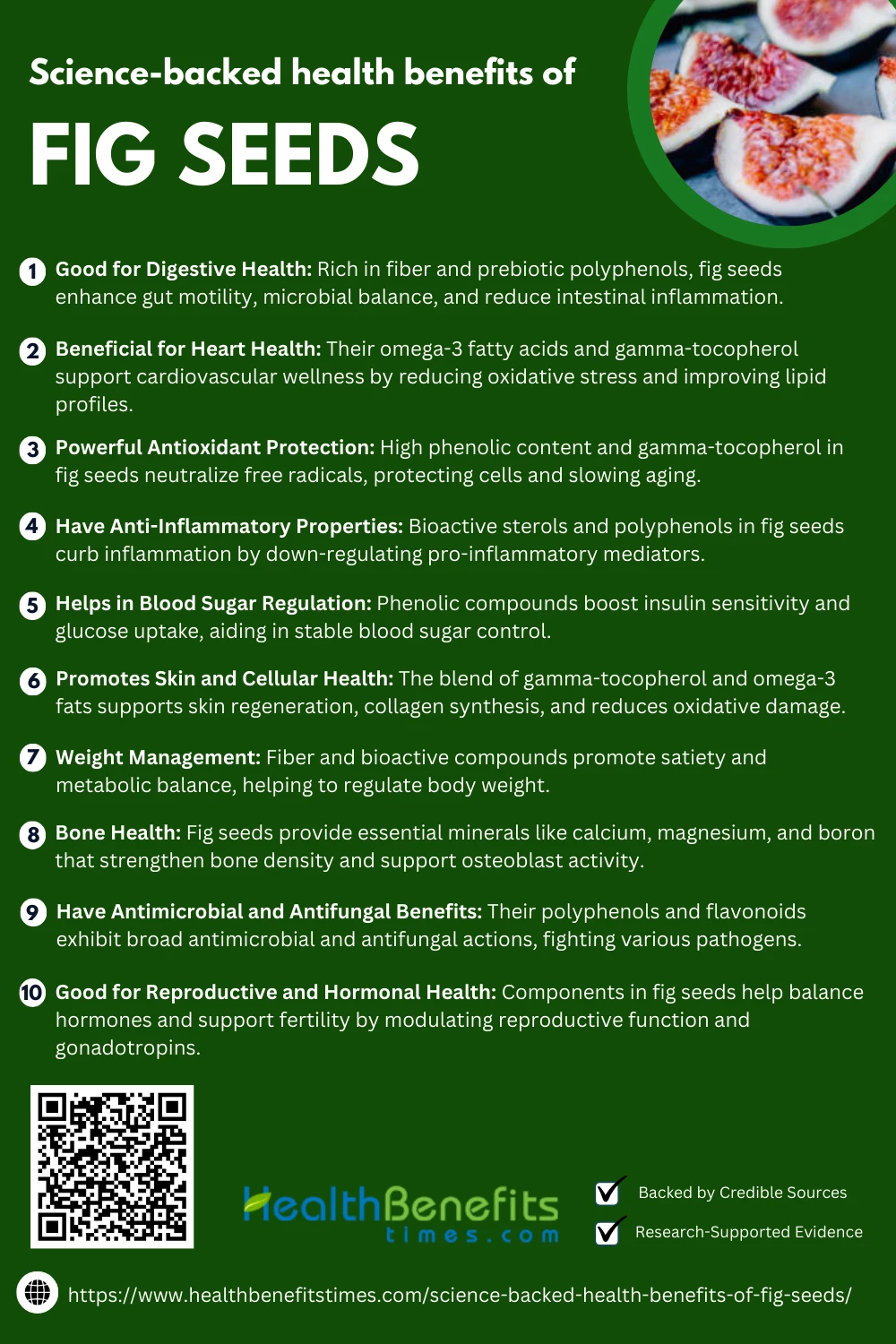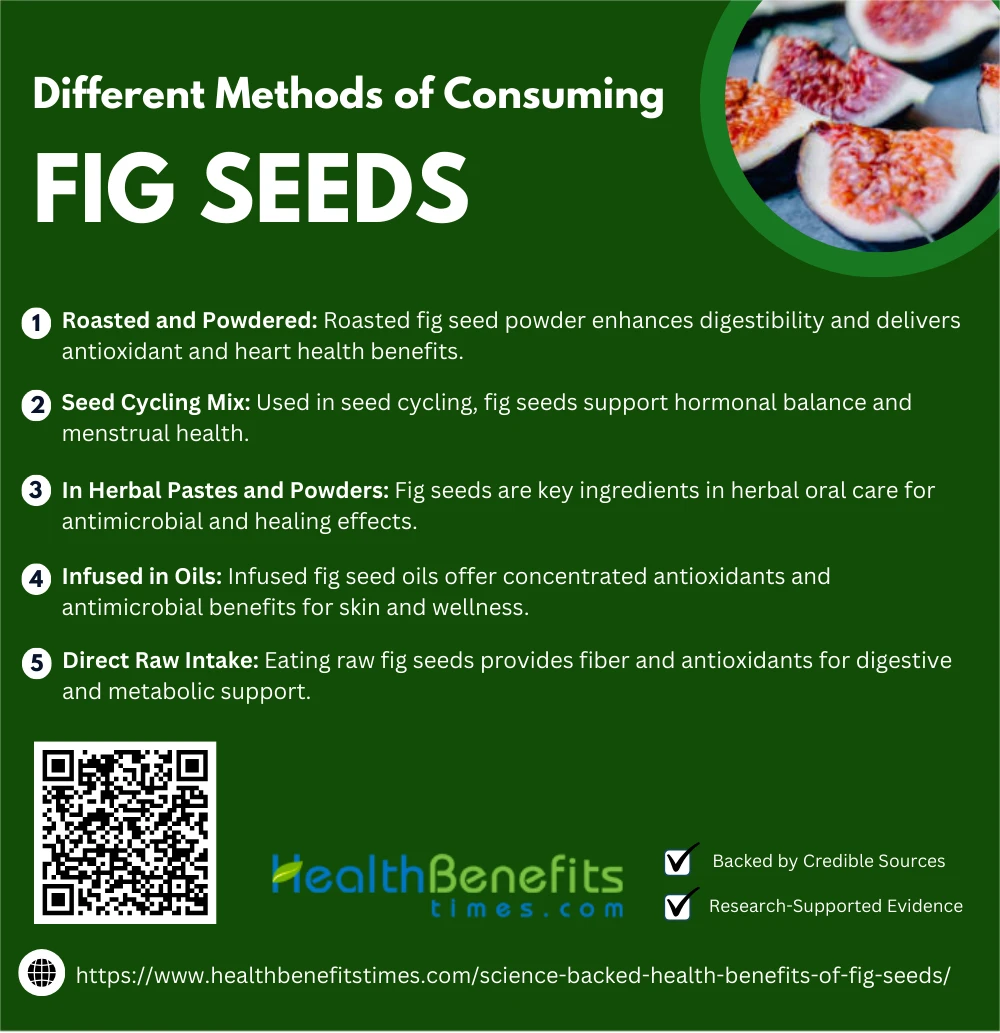- Fig seeds are the tiny edible seeds found inside figs, rich in nutrients and bioactive compounds.
- Backed by scientific studies, fig seeds support digestion, heart health, and blood sugar balance.
- Their high fiber, healthy fats, and antioxidant content make them a powerful addition to a healthy diet.
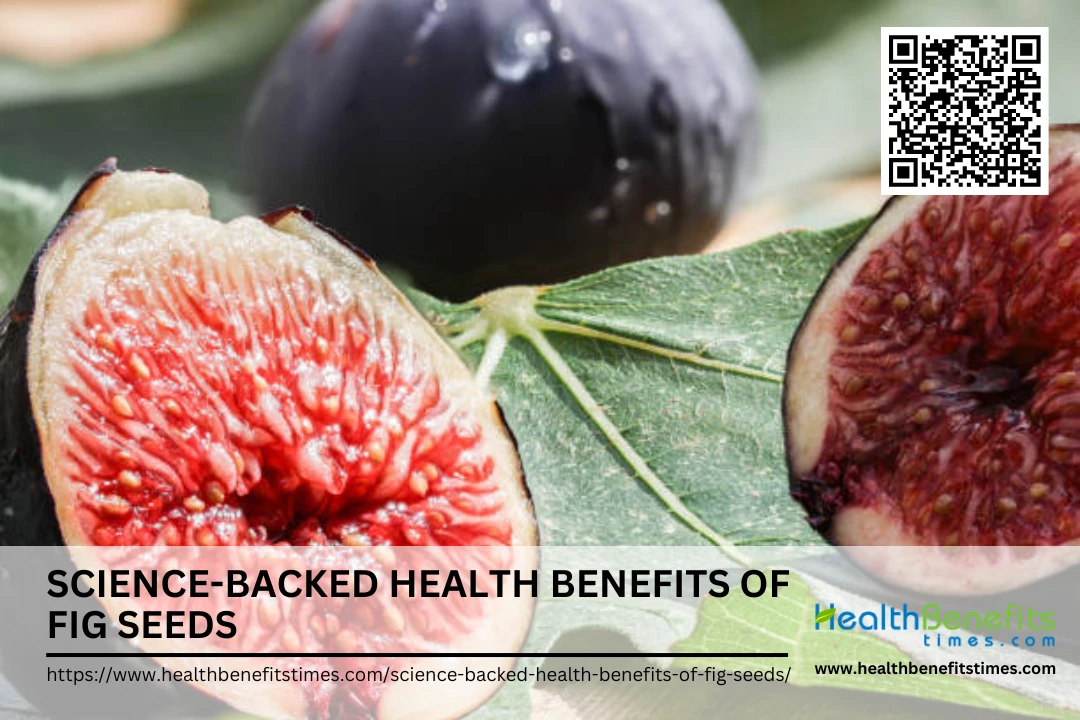 Fig seeds are the small edible seeds found inside the fruit of Ficus carica L., valued for their rich content of dietary fiber, essential fatty acids, polyphenols, and micronutrients. These seeds are gaining attention for their nutritional and therapeutic properties in both food science and functional health research. In recent years, fig seeds have emerged as a focus in functional nutrition due to their wide-ranging bioactive compounds that contribute to various health benefits. Scientific investigations suggest that fig seed oil is rich in phenolic antioxidants, plant sterols, and unsaturated fatty acids, which may help reduce oxidative stress and inflammation—factors linked to cardiovascular and metabolic diseases Phenolic compounds in fig seed oil. Additionally, research has identified that fig seeds possess antimicrobial properties and may support gastrointestinal health, making them a promising ingredient in the development of functional foods and nutraceuticals.
Fig seeds are the small edible seeds found inside the fruit of Ficus carica L., valued for their rich content of dietary fiber, essential fatty acids, polyphenols, and micronutrients. These seeds are gaining attention for their nutritional and therapeutic properties in both food science and functional health research. In recent years, fig seeds have emerged as a focus in functional nutrition due to their wide-ranging bioactive compounds that contribute to various health benefits. Scientific investigations suggest that fig seed oil is rich in phenolic antioxidants, plant sterols, and unsaturated fatty acids, which may help reduce oxidative stress and inflammation—factors linked to cardiovascular and metabolic diseases Phenolic compounds in fig seed oil. Additionally, research has identified that fig seeds possess antimicrobial properties and may support gastrointestinal health, making them a promising ingredient in the development of functional foods and nutraceuticals.
Nutritional Profile of Fig Seeds
Fig seeds are packed with essential nutrients, including dietary fiber, healthy fats, antioxidants, and trace minerals. These tiny seeds contribute to overall health by supporting digestion, heart function, and cellular protection.
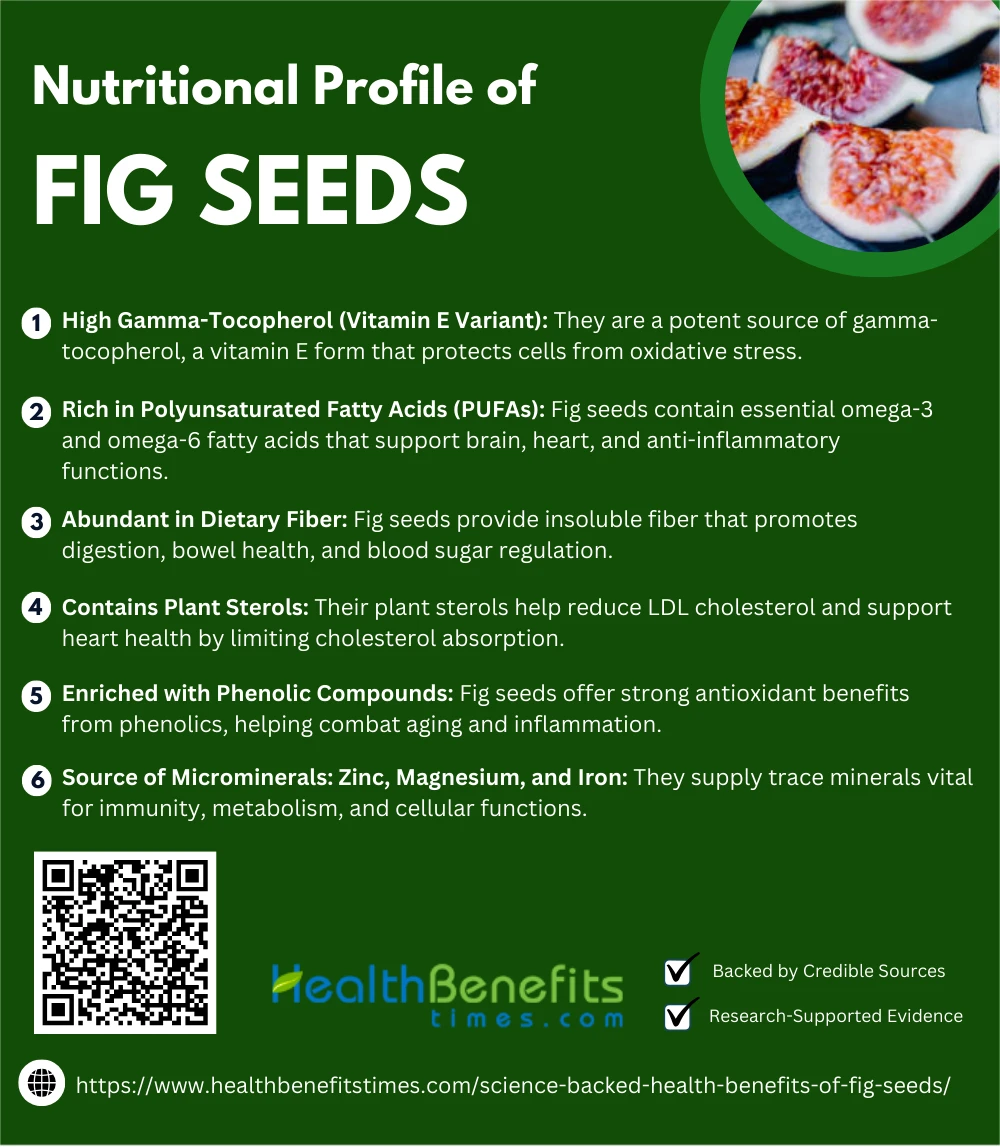 1. Rich in Polyunsaturated Fatty Acids (PUFAs)
1. Rich in Polyunsaturated Fatty Acids (PUFAs)
Fig seeds are notably high in essential polyunsaturated fatty acids, particularly omega-3 and omega-6, which play critical roles in brain function, cardiovascular health, and inflammation control. These healthy fats are not synthesized in the human body and must be obtained from the diet. Studies highlight the fig seed oil’s unique balance of linoleic and linolenic acids, offering anti-inflammatory and lipid-regulating properties.
2. High Gamma-Tocopherol (Vitamin E Variant)
Fig seed oil is a novel source of gamma-tocopherol, a powerful form of vitamin E with antioxidant capabilities that surpass alpha-tocopherol in protecting cells from reactive nitrogen species. This compound supports immune function, skin regeneration, and protection against oxidative stress, thus enhancing overall metabolic and cellular health. (1)
3. Abundant in Dietary Fiber
Whole fig seeds contribute significant insoluble dietary fiber, which aids digestion, promotes bowel regularity, and fosters a healthy gut microbiome. Fiber also slows glucose absorption, helping with glycemic control and appetite regulation—important factors for diabetes prevention and metabolic health.
4. Contains Plant Sterols
Fig seeds are a good source of plant sterols (phytosterols), which structurally resemble cholesterol and can block its absorption in the intestine. Regular intake of these sterols is associated with lowered LDL cholesterol levels and improved lipid profiles, making them beneficial for cardiovascular health. (2)
5. Enriched with Phenolic Compounds
Phenolic acids and flavonoids extracted from fig seeds contribute to their robust antioxidant activity. These phytochemicals neutralize free radicals and modulate signaling pathways involved in inflammation and cell aging. Supercritical CO₂ extraction studies reveal high phenolic yields in fig seed oil, indicating strong functional food potential. (3)
6. Source of Microminerals: Zinc, Magnesium, and Iron
While not as concentrated as fruits or leaves, fig seeds contain trace minerals like zinc, magnesium, and iron. These are vital for immune function, oxygen transport, nerve conduction, and cellular metabolism. The seeds’ role in nutraceutical blends enhances their bioavailability and usability in food formulations.
Comparison with whole figs and fig leaves
| Nutrient / Compound | Fig Seeds | Whole Figs | Fig Leaves |
| Dietary Fiber | High (mostly insoluble) | High (soluble & insoluble) | Low |
| Polyunsaturated Fatty Acids (PUFAs) | High (Omega-3 & 6) | Low | Negligible |
| Gamma-Tocopherol (Vitamin E) | High | Low | Moderate |
| Phenolic Compounds | Moderate to High | High | Very High |
| Plant Sterols | Present | Trace | Absent |
| Microminerals (Zn, Mg, Fe) | Moderate | High (especially potassium) | High (calcium, potassium) |
| Antioxidant Capacity | High | High | Very High |
| Anti-inflammatory Effects | Moderate | Moderate | High |
Science-Backed Health Benefits of Fig Seeds
Fig seeds offer impressive health benefits backed by science. Rich in nutrients and bioactive compounds, they support digestion, heart health, blood sugar control, and more, making them a powerful dietary addition.
Fig seeds support digestive health through their rich content of insoluble fiber and prebiotic polyphenols that enhance gut motility and nourish beneficial microbiota. Research has shown that the polyphenol ellagic acid, abundant in fig seeds, improves intestinal integrity and microbial balance Basso et al., 2024. (4) Additionally, dietary fiber from figs promotes fermentation by gut bacteria Mahmoudi et al., 2016. (5) Fig seed oil’s antimicrobial properties help reduce harmful pathogens Hssaini et al., 2020, while also improving intestinal transit time Barolo et al., 2014 and reducing inflammation in colonic tissue Jeong & Lachance, 2001. (3) (6) (2)
2. Beneficial for Heart Health
Fig seeds contribute significantly to cardiovascular wellness by delivering high levels of omega-3 fatty acids and gamma-tocopherol, both known to reduce oxidative stress and support lipid balance. Clinical evaluations demonstrate improved lipid profiles with fig seed consumption Kaya & Oguz, 2024. (7) Fig seed oil’s anti-inflammatory compounds help reduce endothelial damage Akder et al., 2021. (8) Fatty acid analysis also revealed cardioprotective linolenic acid content Irchad et al., 2025. (9) Other studies confirm fig seed oil supports blood pressure control and LDL reduction Tarlacı, 2021, aligning with evidence that plant-based tocopherols modulate oxidative lipids Al-Okbi et al., 2018. (10) (11)
3. Powerful Antioxidant Protection
Fig seeds are a rich source of phenolic compounds and gamma-tocopherol, both of which exhibit significant antioxidant effects. These compounds help neutralize reactive oxygen species (ROS) and delay cellular aging Hssaini et al., 2020. Studies show that fig seed oil is particularly effective due to its high phenolic yield Akder et al., 2021. (8) The cold-pressed oil contains flavonoids that further boost radical-scavenging activity Ustun-Argon et al., 2021. Gamma-tocopherol extracted from fig seeds outperforms alpha-tocopherol in oxidative protection Tarlacı, 2021, making it a potent natural antioxidant. (11)
4. Have Anti-Inflammatory Properties
Bioactive components in fig seeds, such as sterols and polyphenols, contribute to their anti-inflammatory potential by down-regulating pro-inflammatory cytokines like TNF-α and IL-6 Mahmoudi et al., 2016. (5) Research shows that fig seed oil suppresses lipid peroxidation and inflammatory mediators in cell models Sirinyıldız et al., 2021. In vivo trials revealed reduced oxidative inflammation when fig seed extracts were administered Kaya & Oguz, 2024. (7) The anti-inflammatory strength is closely tied to its flavonoid and lignan profile Soni et al., 2014, showing promising nutraceutical potential Akder et al., 2021. (8) (12)
5. Helps in Blood Sugar Regulation
Fig seeds contribute to blood sugar regulation primarily due to their high content of phenolic compounds, which enhance glucose uptake and improve insulin sensitivity. Studies confirm that fig-derived polyphenols promote GLUT4 activity and mitigate insulin resistance Chiang et al., 2022. (13) Flavonoids in fig seeds reduce postprandial glucose spikes. Morin-like compounds found in figs enhance glucose metabolism. Additional studies show their effect on AMPK activation Saadeldeen et al., 2020 and insulin mimetic activity Huang et al., 2015. (14) (15)
6. Promotes Skin and Cellular Health
Fig seed oil is gaining recognition for its cosmeceutical benefits due to its high content of gamma-tocopherol and omega-3 fatty acids. These compounds support skin regeneration and combat oxidative stress that contributes to aging Akder et al., 2021. (16) Clinical trials show accelerated wound healing from vitamin E isoforms in fig oil Elsy et al., 2017. (17) It also boosts collagen synthesis Michalak et al., 2024, enhances barrier repair Rodrigues et al., 2023, and improves dermal antioxidant defense Michalak, 2022. (18) (19) (20)
7. Weight Management
Fig seeds are rich in dietary fiber and bioactive compounds that may enhance satiety and support metabolic health, making them valuable in weight management. A study published in the Indian Journal of Hematology and Blood Transfusion emphasizes their iron-absorption synergy with vitamin E-rich seeds aiding energy metabolism. (21) Fig consumption also correlates with reduced body fat and improved lipid profiles, and is suggested for appetite regulation. (22) Additionally, antioxidant-rich fig seeds may modulate gut microbiota aiding weight control, while their polyphenols suppress lipogenesis.
8. Bone Health
Fig seeds contain bone-supportive nutrients such as calcium, magnesium, and boron, which are vital for maintaining bone density and structure. These minerals, along with gamma-tocopherol, enhance osteoblast activity and reduce oxidative damage to bone tissue. Studies also highlight fig seed oil’s antioxidant role in bone matrix preservation Akder et al., 2021. (8) Boron in fig derivatives supports calcium metabolism and bone growth Arjmandi & George, 2020. Research confirms fig extracts can prevent bone loss in postmenopausal models Murthy et al., 2024. (23) Phytochemical synergy further enhances bone mineralization Guven et al., 2024. (24)
9. Have Antimicrobial and Antifungal benefits
Fig seeds possess significant antimicrobial and antifungal activities due to their polyphenolic and flavonoid contents. Research highlights their efficacy in oral hygiene formulations, showing broad antimicrobial protection. (25) Further, fig extracts exhibit strong antifungal properties against Candida species. (26) Their seed oil contains antimicrobial terpenoids and coumarins, and studies confirm inhibition of bacterial strains including E. coli and S. aureus. (27) Antioxidant synergy enhances their pathogen suppression efficacy.
10. Good for Reproductive and Hormonal Health
Fig seeds play a vital role in reproductive and hormonal health by contributing to hormonal balance and fertility regulation. Studies show that seed cycling diets, including fig seeds, may help alleviate menstrual irregularities and support hormone synchronization. (28) Fig extracts also demonstrate protective effects on reproductive hormone levels and ovarian function. Their lignan content helps regulate gonadotropins essential for fertility. Additional evidence shows that figs support testosterone and estrogen modulation, and fig-rich diets may enhance sperm quality and endocrine health in men.
Different methods of consuming Fig Seeds
Fig seeds can be consumed in various ways—eaten whole with figs, ground into smoothies, added to cereals, or used as oil or extract—making it easy to include in your diet.
Roasting and powdering fig seeds enhances their digestibility and boosts antioxidant activity, offering a nutrient-dense supplement for health-conscious diets. Roasted fig seed powder is known for its antimicrobial and antioxidant properties, aiding in digestion and metabolic balance. (29) (30) Studies also highlight powdered seeds’ potential in modulating lipid profiles, supporting cardiovascular health. (31)
2. Seed Cycling Mix
Fig seed cycling mixes are gaining popularity for balancing hormones naturally across menstrual phases. Research highlights their role in modulating estrogen and progesterone, beneficial for menstrual irregularities. (32) Clinical evaluations confirm their positive effect on reproductive hormones, and nutrition guides emphasize the mix’s holistic impact on hormone health, especially for conditions like PCOS. (33) (34)
3. In Herbal Pastes and Powders
Fig seeds are widely used in herbal pastes and powders for their antimicrobial and immunostimulatory benefits. Research supports their effectiveness in Ayurvedic oral care products like toothpaste and powder formulations. (25) Additional studies show fig extract-infused powders possess antioxidant and wound-healing effects, while traditional medicine integrates them to improve oral hygiene. (35)
4. Infused in Oils
Infusing fig seeds in carrier oils like wheat germ enhances their antioxidant delivery and bioavailability in topical and dietary forms. Studies highlight fig seed oil’s rich gamma-tocopherol and omega-3 content, while phyto-nanoemulsion techniques preserve oil potency. (16) (36) Additionally, fig-infused oils show antimicrobial properties, making them ideal for holistic wellness. (37)
5. Direct Raw Intake
Consuming fig seeds raw delivers maximum fiber and antioxidants, which support digestion and metabolism. Raw seeds are a sustainable snack alternative and may help prevent dietary deficiencies during food stress periods, especially in rural population. Their natural nutrient profile makes them beneficial for maintaining gut balance and regulating satiety. (27)
Side effects of using Fig Seeds
While fig seeds offer health benefits, they may cause side effects like digestive discomfort or allergic reactions in some individuals. It’s important to consume them in moderation and monitor your body’s response.
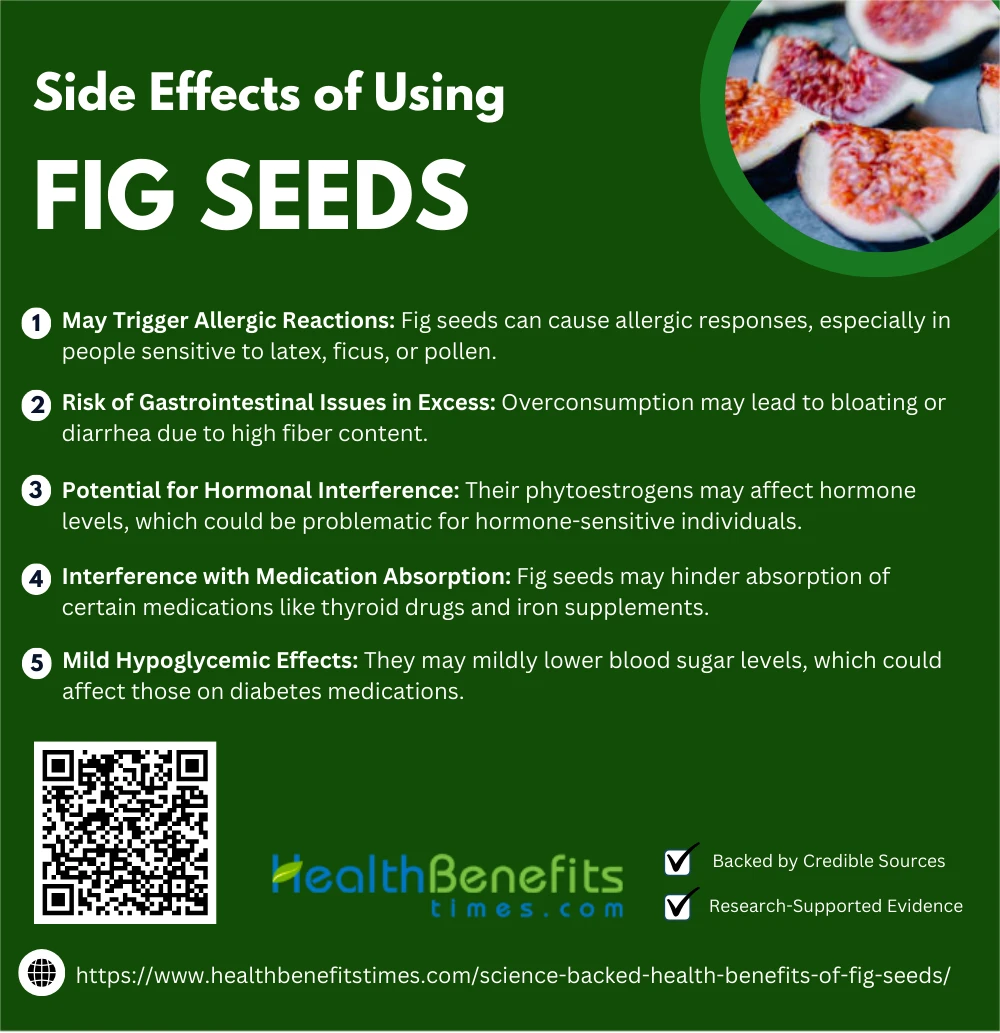 1. May Trigger Allergic Reactions
1. May Trigger Allergic Reactions
Some individuals may experience allergic responses to fig seeds, particularly those sensitive to ficus or latex. Symptoms can include oral itching, dermatitis, or more severe reactions. Fig and Ficus latex cross-react with birch and pollen allergens, contributing to hypersensitivity and pollen-latex-fruit syndromes. (38) (39)
2. Risk of Gastrointestinal Issues in Excess
Excessive consumption of fig seeds may lead to gastrointestinal discomfort, especially bloating or diarrhea, due to their high insoluble fiber content. Sensitive individuals or those with IBS should moderate intake. Studies indicate that overconsumption of plant seeds like figs may irritate gut mucosa in susceptible individuals, potentially leading to digestive imbalance, and nutrient absorption issues. (40) (41)
3. Potential for Hormonal Interference
Due to their phytoestrogenic content, fig seeds may influence hormonal pathways, particularly estrogen and progesterone levels. This could be beneficial for some, but risky for hormone-sensitive individuals. Research shows they can modulate gonadotropin release, act as phytosteroid regulators, and alter endocrine responses in women. (42) (43)
4. Interference with Medication Absorption
The high fiber and polyphenol content in fig seeds can reduce absorption efficiency of medications, particularly thyroid drugs and iron supplements. Research confirms that certain dietary fibers interfere with levothyroxine absorption and iron uptake, while fig’s antioxidant phytocompounds may delay drug metabolism, suggesting cautious timing around medication intake. (44)
5. Mild Hypoglycemic Effects
Fig seeds contain bioactive compounds with mild blood sugar-lowering properties. Their polyphenolic content can enhance insulin sensitivity and reduce glucose spikes. In animal models, fig seed oil significantly reduced fasting blood glucose levels. Another study on fig fruit extracts showed hypoglycemic effects through insulin modulation. Flavonoids in figs also aid glucose regulation, making them promising in diabetic diets. (45)
Conclusion
Fig seeds, though small, are a powerhouse of nutrition and health-promoting compounds. Backed by scientific research, they offer a wide range of benefits—from improving digestion and heart health to regulating blood sugar and enhancing skin vitality. Their rich content of fiber, healthy fats, antioxidants, and essential minerals makes them a valuable addition to a balanced diet. Whether consumed whole, ground, or as oil or extract, fig seeds can easily be incorporated into daily meals. However, like any natural remedy, moderation is key. With growing scientific interest, fig seeds continue to emerge as a promising functional food for long-term health support.


